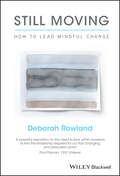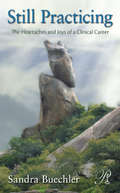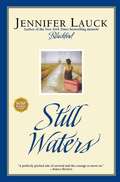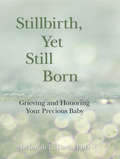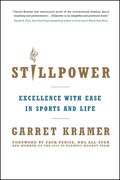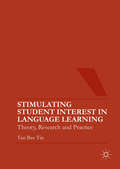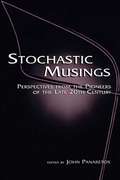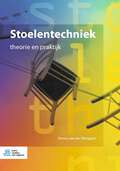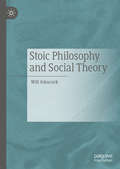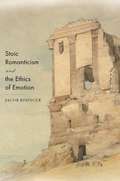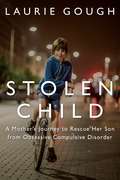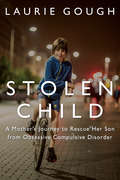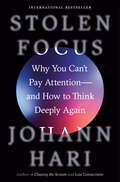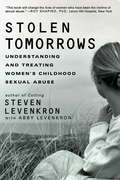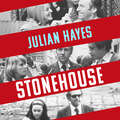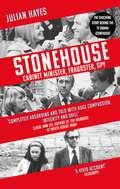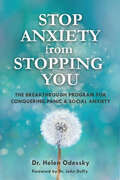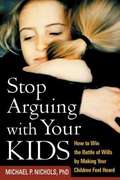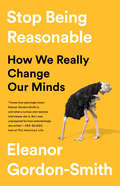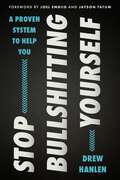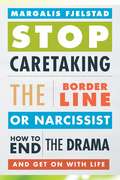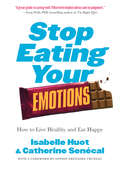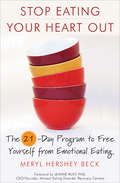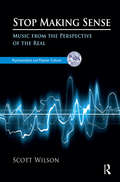- Table View
- List View
Still Moving: How to Lead Mindful Change
by Deborah RowlandStill Moving: How to Lead Mindful Change sets out an innovative approach for guiding organisations and indeed entire systems through ongoing, disruptive change. It combines Deborah Rowland's own rigorous research into change and its leadership with insights from her extensive field experience helping major global corporations including GlaxoSmithKline, RWE and Shell achieve lasting change with increased productivity, employee engagement and responsible societal impact. It is filled with helpful inspiring stories of leadership and change from the real world and, bravely, the author's own personal journey. Challenging leaders to cultivate both their inner and outer skills necessary for success, Still Moving weaves together the "being" and "doing" of states of leading change and emphasises the importance of a mindful stance and deep systemic perception within a leader. With the goal of collaborative, sustainable change, the book delves into a variety of important topics, including present-moment awareness, intentional response, edge and tension and emergent change. Compelling and provocative, Still Moving questions the conventional wisdom of much change theory and asks that leaders first work on their inner source in order to more effortlessly change the world around them.
Still Practicing: The Heartaches and Joys of a Clinical Career (Psychoanalysis in a New Key Book Series #15)
by Sandra Buechler"Still practicing" has several meanings. Still practicing suggests that the balance of heartaches and joys must not deter us from pursuing a clinical practice. At the same time, still practicing suggests that for the clinician "practice" never "makes perfect." We continue to refine our clinical instruments over our entire working lives. Framed by her previous work on the concept of emotional balance, Sandra Buechler investigates how vicissitudes in a clinical career can have a profound and lasting impact on the clinician's emotional balance, and considers how the clinician's resilience is maintained in the face of the personal fallout of a lifetime of clinical practice. At each juncture, from training to early phases of clinical experience, through mid and late career, she asks, what can help us maintain a vital interest in our work? How do we not burn out? Aimed at the nexus of the personal and theoretical, Still Practicing concentrates on the sadness, feelings of shame, and satisfactions inherent in practice, and encourages newcomers and veterans alike to make career choices mindful of their potential long-term impact on their feelings about being therapists. It poses a question vital to the life of the clinician: How can we strike a balance between the work's inevitable pain and its potential joy?
Still Waters
by Jennifer LauckAnger is a poison ivy in the heart and if it grows unchecked, it covers all the soft spaces where you love and understand and feel joy. There's power in anger, sure, a power that can help you survive. But true wisdom is in knowing when to let it go. In Still Waters, Jennifer Lauck continues the riveting true story begun in her critically acclaimed memoir, Blackbird. Clutching her pink trunk filled with secret treasures, the last relics of a lost childhood, twelve-year-old Jenny steps off a bus in Reno and straight into the wide-open future, where no path is certain except that of her own heart....Separated from her brother, Bryan, and passed from caretaker to caretaker, Jenny endures as she always has: by following the inner compass of the survivor. But when Bryan chooses a shocking, tragic destiny, Jenny must at last confront the secrets, lies, and loneliness that have held her prisoner for years. Embarking on a search for answers, the adult Jenny discovers that the past cannot be locked away forever -- even when unraveling one's own anger and pain seems an impossible feat. Now, in the warmth and understanding of her marriage, in the eyes of her child, and in powerful conversations with a dynamic young priest, Jennifer finds her own miracles. A hardened heart learns to love. A damaged soul finds peace. And life, once merely a matter of survival, becomes rich with the joys of truly living.
Stillbirth, Yet Still Born: Grieving and Honoring Your Precious Baby
by Ph.D. Deborah L. DavisThis small book offers tailored information and support to accompany parents through the early hours, days, and weeks that follow the death and birth of their beloved baby.<P><P> It also offers strategies for enduring labor and delivery, and compassionate suggestions for spending time with the little one. Parents will find ideas for affirming and honoring their precious baby's life.
Stillpower: Excellence with Ease in Sports and Life
by Garret KramerFuel Your Performance, and Life, with the Clarity of Stillpower For years, athletes, coaches, parents, and organizations have searched for the secrets to optimum mental performance. However, in spite of a myriad of tools and techniques, success and contentment continue to be as elusive as ever, until now. Garret Kramer's Stillpower offers a revolutionary explanation for this predicament and provides a basic, yet dynamic, approach for the future. In an accessible style, Kramer reveals the innate principles behind consistent achievement and highlights the misalignment between the experiences of all performers and the strategies of the coaches, psychologists, and experts who are hoping to help them. Stillpower uses real-life examples to explore such questions as: What is "the zone" and what must we do (or not do) to get there? Why do we need to understand the difference between insight and intellect? Is goal setting really useful? Why doesn't willpower work? And why do the best mentors focus on a person's state of mind and not behavior? Virtually all of us--athletes and non-athletes alike--are looking outside of ourselves, trying to unlock the keys to happiness, freedom, and excellence with ease. Stillpower encourages us to look within to finally find the answers.
Stimulating Student Interest in Language Learning
by Tan Bee TinThis book explores the issues and concerns many language teachers have in not just helping able students to learn a foreign or second language but more importantly how to get reluctant learners to become interested in language learning. Tin proposes 'interest' as an important construct that requires investigation if we are to understand second language learning experiences in a modern globalised world. The book offers both theoretical explorations and empirical findings arising from the author's own research in the field. Chapters demonstrate how various theoretical and empirical findings can be applied to practice so as to raise the awareness of the importance of interest in language learning and teaching. For teacher trainers and educators, researchers, and practising language teachers, this comprehensive study provides tools to stimulate student interest in language learning for successful language learning.
Stochastic Musings: Perspectives From the Pioneers of the Late 20th Century
by John PanaretosThis new edited volume features contributions from many of the leading scientists in probability and statistics from the latter part of the 20th century. It is the only book to assemble the views of these leading scientists--the pioneers in their respective fields. Stochastic Musings features contributions by: *Sir David Cox on statistics and econometrics; *C.R. Rao, M.B. Rao, and D.N. Shanbhag on convex sets of multivariate distributions and their extreme points; *Bradley Efron on the future of statistics; *David Freedman on regression association and causation; *Vic Barnett on sample ordering for effective statistical inference with particular reference to environmental issues; *David Bartholomew on a unified statistical approach to some measurement problems in the social sciences; *Joe Gani on scanning a lattice for a particular pattern; *Leslie Kish on new paradigms for probability sampling (his last paper); *Samuel Kotz and Norman L. Johnson on limit distributions of uncorrelated but dependent distributions on the unit square; *Samuel Kotz and Saralees Nadarajah on some new elliptical distributions; *Jef Teugels on the life span of a renewal; *Wolfgang Urfer and Katharina Emrich on maximum likelihood estimates of genetic effects; and **Vladimir M. Zolotarev on convergence rate estimates in functional limit theorems. The volume also includes the following contributions by faculty members of the Department of Statistics, Athens University of Economics and Business: *J. Panaretos, E. Xekalaki, and S. Psarakis on a predictive model evaluation and selection approach--the correlated gamma ratio distribution; *J. Panaretos and Z. Tsourti on extreme value index estimators and smoothing alternatives; *E. Xekalaki and D. Karlis on mixtures everywhere; and * Ir. Moustaki on latent variable models with covariates. Stochastic Musings will appeal to researchers, professionals, and students interested in the history and development of statistics and probability as well as in related areas, such as physics, biometry, economics, and mathematics. Academic and professional statisticians will benefit from the book's coverage of the latest developments in the field, as well as reflections on the future directions of the discipline.
Stoelentechniek: theorie en praktijk
by Remco van der WijngaartDit boek helpt therapeuten om de stoelentechniek toe te passen in hun praktijk. Met die techniek kunnen ze cliënten helpen afstand te nemen van oude overtuigingen en verstandelijk inzichten om te zetten in correctieve emotionele ervaringen. Voor therapeuten die al ervaring hebben met de techniek biedt het boek handvatten om effectiever de uitdagende situaties te kunnen hanteren bij het toepassen van de stoelenoefening. Het boek beschrijft de toepassing van de stoelentechniek in de verschillende fasen van de behandeling. Achtereenvolgens behandelt het boek de stoelentechniek in de analysefase, de beginfase, de middenfase en de eindfase. Het boek biedt telkens tal van variaties in het gebruik van de techniek, met veel praktijkvoorbeelden. Elk van deze hoofdstukken eindigt met het beantwoorden van diverse ‘Wat nou als…?’-vragen waar therapeuten in de klinische praktijk mee te maken krijgen. Vervolgens behandelt het boek specialistische toepassingsgebieden zoals rouw en relatieproblemen, en beschrijft het de mogelijkheden om stoelentechniek online in te zetten. Het laatste hoofdstuk richt zich op valkuilen voor de therapeut. Stoelentechniek theorie en praktijk is geschreven door Remco van der Wijngaart, psychotherapeut en gezondheidszorgpsycholoog. Hij is meer dan twintig jaar werkzaam geweest op een academische afdeling van een ambulante instelling voor geestelijke gezondheidszorg. Daar participeerde hij als therapeut aan diverse behandelstudies bij angst-, somatoforme- en eetstoornissen en persoonlijkheidsstoornissen. In een eerste behandelstudie naar de effectiviteit van schematherapie voor borderlinepersoonlijkheidsstoornis is hij getraind en gesuperviseerd in de stoelentechniek door Jeffrey Young, grondlegger van schematherapie. Momenteel is Remco werkzaam in een zelfstandige praktijk voor psychotherapie in Maastricht. Hij heeft, in samenwerking met anderen, diverse audiovisuele producties ontwikkeld, zoals Fine Tuning Chairwork waarin 34 scènes alle facetten tonen van de stoelentechniek.
Stoic Philosophy and Social Theory
by Will JohncockThis book puts recently re-popularized ancient Stoic philosophy in discussion with modern social theory and sociology to consider the relationship between an individual and their environment. Thirteen comparative pairings including Epictetus and Émile Durkheim, Zeno and Pierre Bourdieu, and Marcus Aurelius and George Herbert Mead explore how to position individualism within our socialized existence. Will Johncock believes that by integrating modern perspectives with ancient Stoic philosophies we can question how internally separate from our social environment we ever are. This tandem analysis identifies new orientations for established ideas in Stoicism and social theory about the mind, being present, self-preservation, knowledge, travel, climate change, the body, kinship, gender, education, and emotions.
Stoic Romanticism and the Ethics of Emotion
by Jacob RisingerAn exploration of Stoicism’s central role in British and American writing of the Romantic periodStoic philosophers and Romantic writers might seem to have nothing in common: the ancient Stoics championed the elimination of emotion, and Romantic writers made a bold new case for expression, adopting “powerful feeling” as the bedrock of poetry. Stoic Romanticism and the Ethics of Emotion refutes this notion by demonstrating that Romantic-era writers devoted a surprising amount of attention to Stoicism and its dispassionate mandate. Jacob Risinger explores the subterranean but vital life of Stoic philosophy in British and American Romanticism, from William Wordsworth to Ralph Waldo Emerson. He shows that the Romantic era—the period most polemically invested in emotion as art’s mainspring—was also captivated by the Stoic idea that aesthetic and ethical judgment demanded the transcendence of emotion.Risinger argues that Stoicism was a central preoccupation in a world destabilized by the French Revolution. Creating a space for the skeptical evaluation of feeling and affect, Stoicism became the subject of poetic reflection, ethical inquiry, and political debate. Risinger examines Wordsworth’s affinity with William Godwin’s evolving philosophy, Samuel Taylor Coleridge’s attempt to embed Stoic reflection within the lyric itself, Lord Byron’s depiction of Stoicism at the level of character, visions of a Stoic future in novels by Mary Shelley and Sarah Scott, and the Stoic foundations of Emerson’s arguments for self-reliance and social reform.Stoic Romanticism and the Ethics of Emotion illustrates how the austerity of ancient philosophy was not inimical to Romantic creativity, but vital to its realization.
Stolen Child: A Mother's Journey to Rescue Her Son From Obsessive Compulsive Disorder
by Laurie GoughA year in the desperate life of a boy transformed by OCD from a bright ten-year-old into a stranger in his own skin. Although Laurie Gough was an intrepid traveller who had explored wild, far-off reaches of the globe, the journey she and her family took in their own home in their small Quebec village proved to be far more frightening, strange, and foreign than any land she had ever visited. It began when Gough's son, shattered by his grandfather's death, transformed from a bright, soccer-ball kicking ten-year-old into a near-stranger, falling into trances where his parents couldn't reach him and performing ever-changing rituals of magical thinking designed to bring his grandpa back to life. Stolen Child examines a horrifying year in one family's life, the lengths the parents went to to help their son, and how they won the battle against his all-consuming disorder.
Stolen Child: A Mother's Journey to Rescue Her Son from Obsessive Compulsive Disorder
by Laurie GoughA year in the desperate life of a boy transformed by OCD from a bright ten-year-old into a stranger in his own skin. Although Laurie Gough was an intrepid traveller who had explored wild, far-off reaches of the globe, the journey she and her family took in their own home in their small Quebec village proved to be far more frightening, strange, and foreign than any land she had ever visited. It began when Gough’s son, shattered by his grandfather’s death, transformed from a bright, soccer-ball kicking ten-year-old into a near-stranger, falling into trances where his parents couldn’t reach him and performing ever-changing rituals of magical thinking designed to bring his grandpa back to life. Stolen Child examines a horrifying year in one family’s life, the lengths the parents went to to help their son, and how they won the battle against his all-consuming disorder.
Stolen Focus: Why You Can't Pay Attention--and How to Think Deeply Again
by Johann HariNEW YORK TIMES BESTSELLER • Our ability to pay attention is collapsing. From the author of Chasing the Scream and Lost Connections comes a groundbreaking examination of why this is happening—and how to get our attention back.&“The book the world needs in order to win the war on distraction.&”—Adam Grant, author of Think Again &“Read this book to save your mind.&”—Susan Cain, author of Quiet WINNER OF THE PORCHLIGHT BUSINESS BOOK AWARD • ONE OF THE BEST BOOKS OF THE YEAR: The Wall Street Journal, Financial Times, New York Post, Mashable, MindfulIn the United States, teenagers can focus on one task for only sixty-five seconds at a time, and office workers average only three minutes. Like so many of us, Johann Hari was finding that constantly switching from device to device and tab to tab was a diminishing and depressing way to live. He tried all sorts of self-help solutions—even abandoning his phone for three months—but nothing seemed to work. So Hari went on an epic journey across the world to interview the leading experts on human attention—and he discovered that everything we think we know about this crisis is wrong. We think our inability to focus is a personal failure to exert enough willpower over our devices. The truth is even more disturbing: our focus has been stolen by powerful external forces that have left us uniquely vulnerable to corporations determined to raid our attention for profit. Hari found that there are twelve deep causes of this crisis, from the decline of mind-wandering to rising pollution, all of which have robbed some of our attention. In Stolen Focus, he introduces readers to Silicon Valley dissidents who learned to hack human attention, and veterinarians who diagnose dogs with ADHD. He explores a favela in Rio de Janeiro where everyone lost their attention in a particularly surreal way, and an office in New Zealand that discovered a remarkable technique to restore workers&’ productivity. Crucially, Hari learned how we can reclaim our focus—as individuals, and as a society—if we are determined to fight for it. Stolen Focus will transform the debate about attention and finally show us how to get it back.
Stolen Tomorrows: Understanding and Treating Women's Childhood Sexual Abuse
by Steven Levenkron Abby Levenkron"The most practical, down to earth, thoughtful, and sensitive book written on women's childhood sexual abuse."--Samuel C. Klagsbrun, MD From the psychotherapist who offered groundbreaking work on self-mutilation (Cutting) comes a landmark examination of the psychology of sexual abuse. Stolen Tomorrows encourages the 20 percent of women who have been abused to think about, talk about, and seek help for what has been their secret shame. In addition to giving therapists and other helpers an empathic insight, Stolen Tomorrows will enable the survivor to recognize herself in both her personal history and her current struggle to overcome the legacy of abuse.
Stonehouse: Cabinet Minister, Fraudster, Spy
by Julian Hayes'The minister's nephew recounts an extraordinary life . . . a vivid account'HENRY DE QUETTEVILLE, Telegraph'Completely absorbing and told with huge compassion, integrity and skill'CAROL ANN LEE, author of The Murders at White House Farm and A Passion For Poison'What a book. I didn't have to turn the pages. They turned themselves I literally consumed the book in just a few hungry sittings . . . Julian Hayes is perfectly placed to tell this story, particularly it's captivating human side . . . most definitely a must read'DR SALEYHA AHSAN, filmmaker and journalist, CambridgeIn November 1974, British MP and former cabinet minister John Stonehouse walked into the sea off a beach in Miami and disappeared, seemingly drowned. Then he was found - on the other side of the world, in Australia - and his extraordinary story began to come to light: a Labour cabinet minister and a devoted family man; also in a long-term affair with his secretary, and a spy for the Czech State Security agency, who had committed fraud and attempted to fake his own death to escape catastrophic business failures. Was it a mental breakdown as he later claimed? Or were there more sinister reasons for his dramatic disappearance? This is the definitive biography of Stonehouse, written by Julian Hayes, who, as the son of Stonehouse's nephew and lawyer, Michael Hayes, is uniquely placed to tell the story of this charismatic but deeply flawed politician. As a criminal lawyer in London, Hayes has used his in-depth knowledge and experience of the criminal courts, not least the Old Bailey, where the Stonehouse trial took place, to forensically examine Stonehouse's story, including Czech defector Josef Frolík's claim that he was a spy. Hayes has unearthed secret reports in the archives in Prague written by Stonehouse's former spymasters. He has also gleaned much from family members and lawyers involved in the trial and from the trial documents and other government papers held in archives in the UK and Australia.
Stonehouse: Cabinet Minister, Fraudster, Spy
by Julian Hayes'Completely absorbing and told with huge compassion, integrity and skill'CAROL ANN LEE, author of The Murders at White House Farm and A Passion For Poison'What a book. I didn't have to turn the pages. They turned themselves I literally consumed the book in just a few hungry sittings . . . Julian Hayes is perfectly placed to tell this story, particularly it's captivating human side . . . most definitely a must read'DR SALEYHA AHSAN, filmmaker and journalist, CambridgeIn November 1974, British MP and former cabinet minister John Stonehouse walked into the sea off a beach in Miami and disappeared, seemingly drowned. Then he was found - on the other side of the world, in Australia - and his extraordinary story began to come to light: a Labour cabinet minister and a devoted family man; also in a long-term affair with his secretary, and a spy for the Czech State Security agency, who had committed fraud and attempted to fake his own death to escape catastrophic business failures. Was it a mental breakdown as he later claimed? Or were there more sinister reasons for his dramatic disappearance? This is the definitive biography of Stonehouse, written by Julian Hayes, who, as the son of Stonehouse's nephew and lawyer, Michael Hayes, is uniquely placed to tell the story of this charismatic but deeply flawed politician. As a criminal lawyer in London, Hayes has used his in-depth knowledge and experience of the criminal courts, not least the Old Bailey, where the Stonehouse trial took place, to forensically examine Stonehouse's story, including Czech defector Josef Frolík's claim that he was a spy. Hayes has unearthed secret reports in the archives in Prague written by Stonehouse's former spymasters. He has also gleaned much from family members and lawyers involved in the trial and from the trial documents and other government papers held in archives in the UK and Australia.
Stonehouse: Cabinet Minister, Fraudster, Spy
by Julian HayesThe true story behind the 2023 ITV series, STONEHOUSE, starring Matthew Macfayden and Keeley Hawes. 'An extraordinary life . . . a vivid account' Telegraph 'Completely absorbing' CAROL ANN LEE, author of The Murders at White House Farm and A Passion For Poison 'I literally consumed the book in just a few hungry sittings . . . most definitely a must read' DR SALEYHA AHSAN, filmmaker and journalist, Cambridge In November 1974, British MP and former cabinet minister John Stonehouse walked into the sea off a beach in Miami and disappeared, seemingly drowned. Then he was found - on the other side of the world, in Australia - and his extraordinary story began to come to light: a Labour cabinet minister and a devoted family man; also in a long-term affair with his secretary, and a spy for the Czech State Security agency, who had committed fraud and attempted to fake his own death to escape catastrophic business failures. Was it a mental breakdown as he later claimed? Or were there more sinister reasons for his dramatic disappearance? This is the definitive biography of Stonehouse, written by Julian Hayes, who, as the son of Stonehouse's nephew and lawyer, Michael Hayes, is uniquely placed to tell the story of this charismatic but deeply flawed politician.
Stop Anxiety from Stopping You: The Breakthrough Program For Conquering Panic and Social Anxiety
by Dr. Helen OdesskyIn this #1 bestseller, a psychologist shares &“excellent ideas&” to stop the anxiety that holds you back from a happy life (Psych Central). Our pace of life has increased exponentially, and we&’re often too busy or preoccupied to attend to our emotions—until they hit with the strength of a tornado. When signs of anxiety and panic appear, they ravage our lives, our dreams, and our spirit. Dr. Helen Odessky, Psy.D., is a licensed clinical psychologist who runs a private practice in Chicago focused on anxiety, OCD, and panic treatment. In this book, Dr. Odessky gives you a six-step framework and practical real-life strategies that work, drawn from her years of clinical experience. You will learn about: Understanding the process of anxietyRecognizing the signs of anxietyHow to overcome anxietyHow to stop panic attacksHow to treat anxiety for lasting results
Stop Arguing with Your Kids
by Michael NicholsFor parents fed up with constant challenges to their authority-but who dread becoming tyrants in their own homes-this book provides a powerful new alternative to "because I said so." Trusted family therapist and author Michael P. Nichols takes on the number-one problem of parents today with the insight and humor that has made his earlier The Lost Art of Listening an enduring bestseller. Presented is a simple, easy-to-follow, yet remarkably effective way to put an end to arguments by refusing to argue back. Instead, the techniques of responsive listening help parents open up better communication in the family; create an atmosphere of respect and cooperation; and take children's feelings into account-without giving in to their demands. Loads of realistic examples help parents defuse whining and defiance and manage common conflicts with preschoolers to teens.
Stop Being Reasonable: How We Really Change Our Minds
by Eleanor Gordon-SmithA thought-provoking exploration of how people really change their minds, and how persuasion is possible. In Stop Being Reasonable, Eleanor Gordon-Smith weaves a narrative that illustrates the limits of human reason. Here, she tells the stories of people who have radically altered their beliefs--from the woman who had to reckon with her husband's terrible secret to the man who finally left the cult he had been raised in since birth. Gordon-Smith shows how we can change the course of our own lives, and asks: what made someone change course? How should their reversals affect how we think about our own beliefs? And in an increasingly divided world, what do they teach us about how we might change the minds of others?Inspiring, perceptive, and moving, Stop Being Reasonable explores why resistance to evidence is often rooted in self-preservation and fear, why we feel shame in admitting we are wrong, and why who we believe is often more important than what we believe. This fascinating book will completely change the way you look at the power of persuasion.
Stop Bullshitting Yourself
by Drew HanlenLegendary NBA trainer Drew Hanlen—performance coach to stars like MVP Joel Embiid and Jayson Tatum—reveals his proven, step-by-step system for personal and professional transformation that has fueled the success of some of the top athletes and business leaders in the world.If you clicked on this book, it’s because somewhere deep down, you know you’ve been bullshitting yourself. You know that making more money, landing a better job, and finally getting in great shape will make your life better. But for some reason, you’ve settled. You’ve read self-help books, listened to peak-performance podcasts, dieted and exercised, and tried countless other remedies. But you still haven’t found solutions to your biggest problems. What can you start doing to finally turn your life around?The answer is to Stop Bullshitting Yourself. This book is a game plan for doing just that.For the past two decades, Drew Hanlen has helped many of the world’s best basketball players reach levels that they didn’t think were attainable—from winning gold medals, championships, MVP and scoring titles to being selected to the All-Star and All-NBA teams.In Stop Bullshitting Yourself, you’ll learn the system that has propelled them to success, and how to apply these same strategies to every aspect of your life.Designed for those who are tired of making empty promises to themselves and who are ready to make real change in their lives, Stop Bullshitting Yourself provides a step-by-step approach to:Audit and eliminate the excuses, thoughts, and habits holding you back.Develop detailed Blueprint Bubbles to facilitate action using simple, achievable steps.Design MicroShifts, repeatable behaviors that break down your goals into manageable chunks.Put in The Unseen Hours: work that works.If you’re tired of making excuses and ready to achieve the results you've always wanted, let’s get started.
Stop Caretaking the Borderline or Narcissist: How to End the Drama and Get on with Life
by Margalis FjelstadPeople with Borderline or Narcissistic Personality Disorders have a serious mental illness that primarily affects their intimate, personal, and family relationships. In this book, Margalis Fjelstad describes how people get into a Caretaker role with a Borderline or Narcissist, and how they can get out.
Stop Eating Your Emotions: How to Live Healthy and Eat Happy
by Isabelle Huot Catherine SénécalDo you sometimes catch yourself snacking when you’re not feeling hungry? Do you crave some foods more when you’re stressed, worried or unhappy?Do you feel you’ve lost control when you give in to a craving? Stop Eating Your Emotions will help you make peace with your body and transform your relationship with food to rediscover the pleasure of eating without guilt or anxiety. Equipped with vast experience supporting people who binge-eat or experience episodes of compulsive eating, Huot and Senécal have developed exercises, tips and tools that are sensible and practical, and that work! By rethinking your relationship to food, reconnecting with your body’s natural signals and modifying the thoughts that cause anxiety, you can break the compulsive-eating cycle and enjoy your life.With a foreword by Sophie Grégoire-Trudeau
Stop Eating your Heart Out: The 21-Day Program to Free Yourself from Emotional Eating
by Meryl Hershey BeckStop Eating Your Heart Out speaks to anyone's challenges with food, weight, and emotional eating, and then offers a multitude of effective self-help tools. As the author discloses her very personal struggle with food and out-of-control eating, she is telling the story of millions of others who use food to self-soothe. The book's focus, however, is on recovery. In her wisdom as a licensed professional clinical counselor, the author enumerates methods that have worked for her and her clients over the past twenty years. Tools for recovery include Emotional Freedom Techniques (EFT), Inner Child work, 12 Step recovery, journaling, creative visualization, meditation, gratitude, conscious living, and so much more. Compulsive overeating is conquerable. If you, or anyone you love, want freedom from emotional eating, this book is for you.
Stop Making Sense: Music from the Perspective of the Real (The\psychoanalysis And Popular Culture Ser.)
by Scott WilsonStop Making Sense offers an original and compelling theory of music "from the perspective of the real" as this term is understood according to the Lacanian orientation in psychoanalysis. Specific examples and cases discussed include Freud's melophobia, or fear of music; Che Guevara's revolutionary a-rhythmia; John F. Nash's obsession with "Bach's Little Fugue"; Talking Heads and Asperger's syndrome/autism; Yoko Ono and the sense of "lack" in the Beatles; the role of "Imagine" in the murder of John Lennon; Brian Eno and the digital auto-generation of Freud's 'oceanic feeling'; Aphex Twin and the brain-dance of the hikikomori; and the utopian promise of Merzbow. The first part of the book explains its theoretical and methodological underpinnings that are based in a reading of subjects and symptoms such as amusia. The second and third parts focus on contemporary examples that look at how music has become both a powerful locus of discontent and also a form of orientation in an age of generalized psychosis imposed by neoliberalism as a form of governance.
